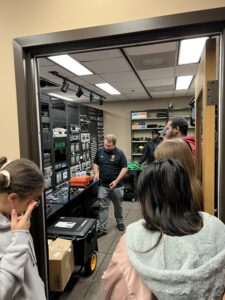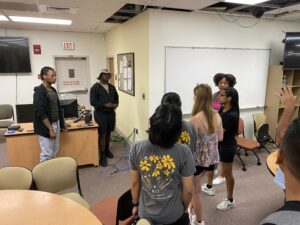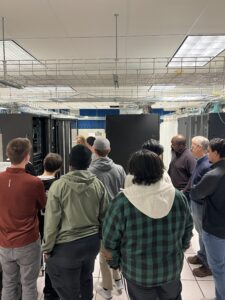Explore Employment Opportunities
The Division of Information Technology (DoIT) has approximately 85 full-time staff members and 80 undergraduate or graduate students who work each day to support the mission of UMBC through the delivery of IT services to the campus.
Professional Staff Positions
View open positions for professional staff
Professionals who work for DoIT have opportunities to meet new people, stay involved, and gain valuable work experience. Many DoIT employees are actively involved in UMBC shared governance groups and volunteer with campus events like Commencement. Outside of campus life, DoIT maintains an active presence in higher education communities, such as Educause and Internet2, and provides professional development opportunities for interested employees.
UMBC Graduate and Undergraduate Student Positions
We invite students of all majors to explore career opportunities with DoIT! We have positions available throughout the year and encourage you to check UMBC’s Handshake for our latest job postings. We offer several types of positions that you can explore in more detail below.
If you would like to be considered for future openings, please complete our DoIT Employment Interest Form. Hiring managers will review your qualifications and reach out to you directly if there’s a match.
Find Open Positions at UMBC’s Handshake
Types of student employment positions
Undergraduate Students – Hourly
We encourage all majors to apply for positions! Most positions in DoIT require a minimum commitment of 10 hours per week during the fall and spring semesters, and many have the opportunity to work additional hours in the winter and summer sessions. Students are paid an hourly wage.
Graduate Students – Hourly
Students in all fields of study are welcome to apply. IT experience is not required, though it is preferred for some roles. Most positions in DoIT require a minimum commitment of 10 hours per week during the fall and spring semesters, and many have the opportunity to work additional hours in the winter and summer sessions. Students are paid an hourly wage.
Graduate Students – Information Technology Assistants
An Information Technology Assistant is classified as a Teaching Assistant who works in the DoIT student employment program. This program is designed for graduate students who primarily focus on completing an applied technical master’s program. Students selected for this program will work for DoIT either on a half-time (10 hours) or full-time (20 hours) basis, performing information technology functions. Information Technology Assistants receive a bi-weekly stipend, and although they do not receive tuition remission, they do receive in-state tuition.
Graduate Students – Graduate Assistantship
A DoIT Graduate Assistant is classified as a Research Assistant who works in the DoIT student employment program. This program is designed for graduate students who are completing a master’s or PhD program in a technical field. Students selected for this program will work for DoIT either on a half-time (10 hours) or full-time (20 hours) basis, performing information technology functions. Graduate Assistants receive tuition remission, a bi-weekly stipend, an academic scholarship to cover university fees, and, with approval, healthcare.
Departments with Student Employees
Technology Support Center (TSC)
Student consultants are the first points of technical contact for the UMBC community. Consultants provide initial triage and support both online and over the phone for a wide range of information technologies including accounts, hardware, instructional technologies, networking, software, telecommunications, and basic web development.
A/V Support & Operations
Students in this group are responsible for helping faculty and staff with A/V equipment within classrooms and conference rooms across campus. They also handle laptop checkout and help troubleshoot problems over the phone and across campus. During slow periods, it is possible to work on homework or other assignments.
A/V Installation
Student employees work with full time staff and senior students to install, repair, and design A/V systems across the campus for various uses, including classroom instruction, lab environments, conference rooms, video conferencing, and digital signage. These positions are very hands-on and will utilize power tools frequently. Students run cabling through conduits and ceilings, mount displays, hang projectors, and build A/V racks.
Desktop Support
This group is responsible for all of the faculty, staff, lab, and public machines across the campus. Students in this group work closely with faculty and staff, troubleshooting technical issues, helping to re-image devices, and distributing new computers across UMBC. They also work with full-time staff on high level projects.
High Performance Computing
Experience is preferred for these positions, specifically some experience working with parallel computing. These positions work to assist faculty in the use of the High Performance Computing Super Computer that DoIT maintains for the campus.
Networking
This group maintains the wired and wireless network for the campus. This includes surveying and installing wireless access points, troubleshooting both wired and wireless connections, helping to manage the data center network, power, and configuring, and installing and maintaining network equipment across the campus.
Communications & Outreach
The Communication team supports the promotion and awareness of outstanding work being done in the Division of Information Technology. They write myUMBC posts, How-To articles, website content, and more. They also provide website accessibility remediation support.
Telecommunications
This group maintains the cabling plant and physical security systems of the campus. These systems include card access, video surveillance, and phone system for UMBC. This group often works to run cabling through conduits and pathways within buildings, ensuring that there is connectivity wherever it is needed.
Unix Systems
Students within this group assist with the operations and maintenance of the Unix systems that run many campus central services. These positions also work very closely within our Google Apps For Education environment, assisting faculty and staff with configuration, and troubleshooting of applications like Google Groups.
Windows Systems
This group maintains the central windows systems and the central VMware virtual environment for the campus. This includes assisting with the configuration of printers and the automation of systems through the use of group policy and other scripting.
Business Intelligence
Experience is preferred for these positions. The Student Business Intelligence Report Developer will design, develop, implement, and support effective and scalable Business Intelligence solutions including reports, data visualizations, dashboards, data marts, and data integration solutions using a variety of tools.
Electronic Forms (DocuSign)
Student Business Analysts on the DocuSign team work with the campus community to convert paper forms to electronic forms, and develop new electronic forms, using DocuSign. Team members will meet with members of the campus community to collect requirements, develop specifications and prototypes, and produce the final forms.
IT Security and Compliance
This group is responsible for supporting the security, audit, and compliance needs for the campus and other DoIT administrative areas. Students work with full-time staff to investigate incidents, create reports, and respond to security concerns.
Project Management
DoIT Student Digital Stories
Ouwen Dai
Ouwen Dai shares his experiences as a computer science student with a focus on cybersecurity and his work as a Security Analyst at DoIT. He highlights the importance of practical experience and the opportunity to connect coursework with work opportunities in college. Ouwen emphasizes the detective nature of cybersecurity work and encourages new students to seek help and engage fully in their learning process.
Passion for Cybersecurity: He discusses his passion for cybersecurity, likening it to detective work. Ouwen enjoys solving puzzles and believes his interest in technology made cybersecurity an ideal field for him.
Experience at DoIT: Ouwen describes his time at DoIT as enriching, due to direct exposure to various tools that are relevant to the cybersecurity industry. He believes that this hands-on experience is crucial for his future career.
Holland Davis
One of the standout aspects of Holland’s time in the AV Systems Department is the plethora of connections she has made. Working in AV involves walking into numerous different rooms and interacting with professors and staff from various departments. This experience has allowed her to cultivate a rich network of contacts across the campus.
Real-World Problem Solving: Another significant benefit of working in AV Systems is the hands-on problem-solving experience. Each room or system presents its unique challenges, and often, the issues reported are vague.
Transitioning to Project Management: As Holland looks to the future, her path is set on a shift from AV Systems to project management. She plans to continue working within DoIT but in a different capacity – as a Project Management Grad Assistant. This switch aligns with her new academic focus in Engineering Management, marking the next step in his professional journey.
Reflections and Advice: Reflecting on her experience, Holland expresses immense gratitude for the opportunities and learning experiences her job has provided.
“Don’t take it for granted because, as my boss is saying, and as I really agree, this is probably the best job I’ve ever had and might have for the foreseeable future. It’s so great being able to work with other students. My bosses are so nice, a lot of the professors are really nice, and it’s just a one-of-a-kind job, truly.”
Mouna Chimata
For many students, university is not just a place for academic development but also a critical ecosystem for professional and personal growth. This narrative resonates with the story of Mouna Chimata, a dedicated student at UMBC who ventured into the world of information systems and found herself immersed in the university’s security department—a move that turned out to be transformative. From gaining confidence in public speaking to securing a full-time position post-graduation, Mouna’s journey is an inspiring testament to the value of real-world experience.
Building Confidence and Technical Skills: When Mouna Chimata joined the security department at DoIT, she discovered more than just a place to work. For her, it was a “great learning platform” that extended beyond textbooks and lectures. Prior to her joining DoIT, she had limited work experience and wasn’t very confident in her technical and speaking abilities. The environment at the security department provided her with ample opportunities to develop these skills.
Memorable Experiences “Lunch & Learns”: One of Mouna’s fondest memories during her time in the department was the “Lunch & Learns.” These sessions were more than just casual gatherings; they were essential for peer interaction and learning. Different departments would come together, providing a platform for collaborative learning and networking. For Mouna, this was an eye-opener into the expansive and interconnected world of information systems. It made her realize the beauty of being part of a big department where learning and personal growth are continuous.
Transitioning to Full-Time Employment: As her academic journey neared its end, Mouna transitioned to a full-time role outside the university. Showcasing her skills learned in DoIT, she acquired an internship at Navy Federal Credit Union the summer before graduating, which led to her being recruited as a full-time systems analyst.


